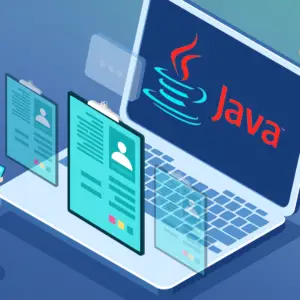Introduction
In today’s tech-driven world, Java Full Stack Development stands as one of the most sought-after skill sets in the industry. At Kelly Technologies, we offer a comprehensive Java Full Stack Course in Hyderabad designed to equip you with the expertise to thrive in this dynamic field. Whether you are an aspiring developer or looking to upskill, understanding the essential skills you’ll gain from our course can help you make an informed decision about your career path.
What is Full Stack Development?
Full Stack Development refers to the practice of working on both the front-end and back-end aspects of a web application. This involves dealing with databases, servers, and the user interface to create a complete and functional application. Java, a versatile and powerful programming language, is commonly used for both server-side and client-side development, making it an ideal choice for full stack development.
Core Skills Acquired in a Java Full Stack Course
- Proficiency in Java ProgrammingThe foundation of our Java Full Stack Course is strong proficiency in Java programming. Java is renowned for its stability and scalability, making it a popular choice for enterprise-level applications. You’ll master Java syntax, object-oriented programming principles, and advanced features such as multi-threading and exception handling. This knowledge is essential for building robust back-end systems and APIs.
- Front-End Development SkillsA significant part of our course focuses on front-end technologies, ensuring you can create visually appealing and user-friendly interfaces. You’ll gain hands-on experience with:
- HTML/CSS: These fundamental technologies are crucial for structuring and styling web pages. You’ll learn how to create responsive designs that work seamlessly across various devices and screen sizes.
- JavaScript: As the scripting language that powers interactivity on the web, JavaScript is key for enhancing user experience. You’ll learn about ES6 features, asynchronous programming, and popular libraries such as jQuery.
- Frameworks and Libraries: Modern front-end development often involves using frameworks and libraries to streamline the development process. You’ll explore tools like React or Angular, which are instrumental in building dynamic and interactive user interfaces.
- Back-End Development with JavaThe back-end development skills you’ll acquire are critical for building server-side logic and managing databases. Key areas of focus include:
- Servlets and JSP: You’ll learn how to use Java Servlets and JavaServer Pages (JSP) for developing server-side components and dynamic web content.
- Spring Framework: Spring is a powerful framework that simplifies Java development by providing comprehensive infrastructure support. You’ll gain expertise in Spring Boot for creating standalone, production-grade applications, and Spring MVC for building web applications.
- RESTful APIs: Understanding how to design and implement RESTful APIs is crucial for enabling communication between front-end and back-end systems. You’ll learn about creating, testing, and consuming APIs using Java.
- Database ManagementManaging data effectively is a key aspect of full stack development. Our course covers:
- SQL and Relational Databases: You’ll gain hands-on experience with SQL (Structured Query Language) for querying and managing relational databases such as MySQL or PostgreSQL.
- ORM Tools: Object-Relational Mapping (ORM) tools like Hibernate simplify the interaction between Java applications and databases. You’ll learn how to use ORM frameworks to manage data persistence efficiently.
- Version Control and CollaborationIn a professional development environment, version control systems are essential for managing code changes and collaborating with other developers. You’ll become proficient in:
- Git: Git is the most widely used version control system. You’ll learn how to create repositories, manage branches, and collaborate on projects using platforms like GitHub or GitLab.
- Collaborative Tools: Understanding tools and workflows for collaboration, such as pull requests and code reviews, will prepare you for working in a team setting.
- Problem-Solving and DebuggingProblem-solving and debugging are integral parts of software development. You’ll develop skills to:
- Debug Code: Learn techniques for identifying and fixing bugs in your code to ensure your applications run smoothly.
- Optimize Performance: Gain insights into performance optimization strategies to enhance the efficiency and scalability of your applications.
Why Choose Kelly Technologies?
At Kelly Technologies, our Java Full Stack Training in Hyderabad is designed to provide a holistic learning experience. Our expert instructors bring years of industry experience and provide practical insights to help you build real-world applications. By the end of the course, you’ll be well-equipped to tackle complex development challenges and advance your career as a proficient Java Full Stack Developer.
Enrolling in our Java Full Stack Course is a step towards becoming a versatile developer capable of handling every aspect of web application development. With the skills you’ll gain, you’ll be prepared to create dynamic and scalable solutions that meet the demands of the modern tech industry.
